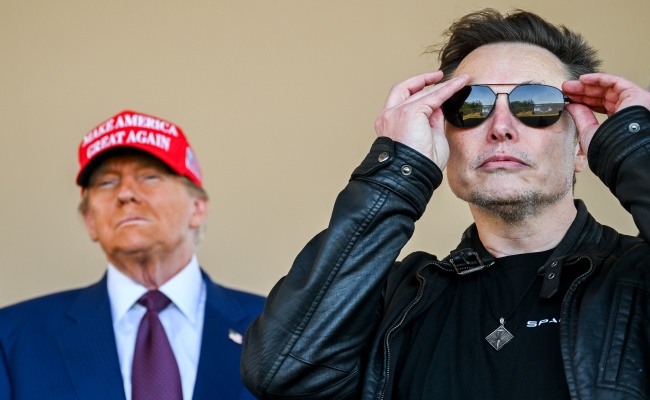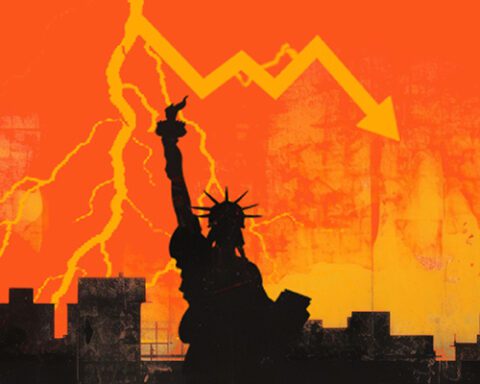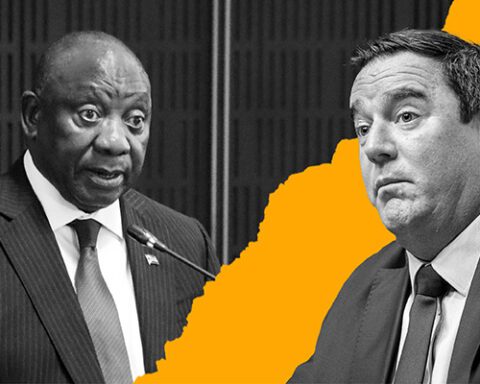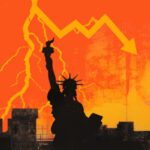South Africans have been feeling the blows from Donald Trump and Elon Musk. The US president drops the bombshell, and the Pretoria-born billionaire leverages his vast social media platform to stoke the fire.
The duo has certainly used that offensive against Africa’s largest economy in recent days. Following Trump’s executive order halting aid to South Africa for discrimination against Afrikaners, Musk used X to whip up anger at EFF leader Julius Malema’s singing Dubul’ ibhunu (Shoot the Boer), a struggle-era song that has been a flashpoint in the country’s race relations debate.
For Goolam Ballim, the chief economist of Standard Bank, it is clear why Musk would be so useful for Trump. It boils down to two things: the distinction between truth and information, and Musk’s position at the coalface of AI.
“Truth is, in fact, a very, very small subset of information. Truth is expensive. It requires investigation. Typically, it is helped by evidence,” Ballim told reporters in Joburg on Tuesday. “It requires time, money and effort. Whereas information doesn’t necessarily do so.”
In this world, the ability to shape information has become a powerful tool. Well-crafted, eloquent narratives can easily be mistaken for the truth, and politicians can easily “weaponise” this to hold onto their positions of power.
And Musk’s businesses exist at the intersection of technology and information control – from X, to SpaceX, to Starlink, which offers communication infrastructure (and is being prevented access to South Africa because Musk doesn’t want to sell a 30% stake to Black shareholders), to Neuralink, which aims to integrate AI with the human brain.
While AI is still in its formative stage, it represents one of the most significant leaps in technology ever, given that it can help make decisions and generate ideas, Ballim said.
Countries that miss these revolutions risk being frozen out of the economic landscape. In the 18th century, the adoption of machines during the Industrial Revolution transformed global power structures, and catapulted Britain to superpower status. The steam engine and telegraph helped the US, Japan and Russia to industrialise too, granting them economic and military supremacy for decades. Those who missed that wave have been economic laggards ever since.
In the modern era, Ballim said, technology and information are the new industrial weapons – and the US is trying to maintain its dominance by preventing Eastern nations from getting access to microchips.
“In a sense, America is not attempting to just Make America Great Again,” Ballim said. “It is attempting to preserve the American empire, which has been declining, through a reincarnated Industrial Revolution and this time through artificial intelligence, the metaverse, quantum computing and immersive reality technologies.”
Musk is the “man of the moment for the US”, he said, with his influence being critical to integrating these technological advancements into the country’s policymaking.
A form of Brexit
Still, Trump’s brashness in threatening to impose tariffs on the US’s three largest trading partners – Canada, Mexico and China – may well backfire.
Eight of the world’s 10 fastest-growing trade routes exclude the US, with many including China instead. This implies that the world isn’t necessarily fragmenting, but is rather realigning around new trade networks, Ballim said.
“When you raise tariffs, it’s the equivalent of disentangling from the global trading system; it’s a form of Brexit,” he said. “The US is, in a sense, isolating itself to its peril over time.”
Nor, despite what Trump claims, is this necessarily good for the average American.
The Tax Foundation, a nonpartisan tax policy research group, estimates that the tariffs imposed on Mexico, Canada and China would reduce US GDP by 0.4%. “If permanently imposed, we estimate the 25% tariffs on Canada and Mexico plus 10% tariffs on China would [amount] to an average tax increase of more than $800 per US household in 2025,” it said.
Top image: US President Donald Trump and Elon Musk. Picture: Brandon Bell/Getty Images.
Sign up to Currency’s weekly newsletters to receive your own bulletin of weekday news and weekend treats. Register here.









